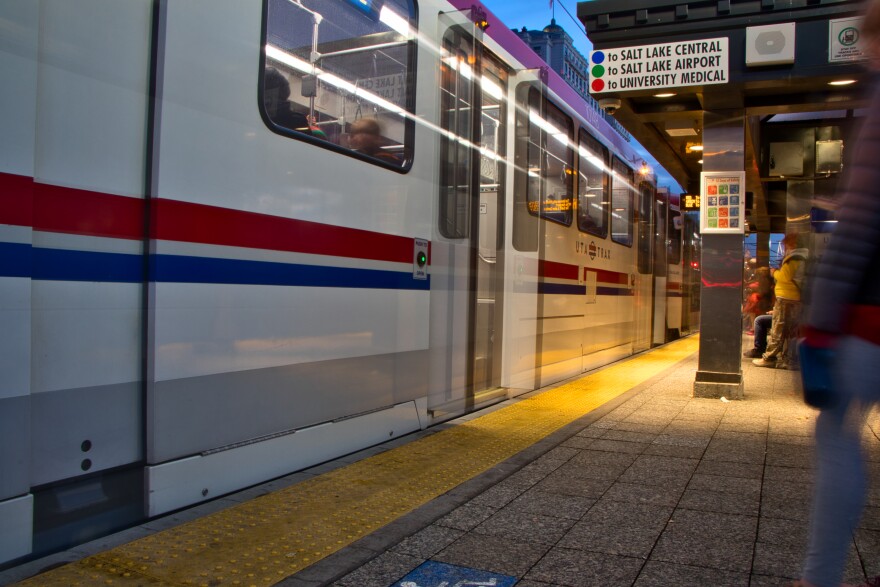Wednesday morning, August 12, 2020
Southern Utah
Rural COVID Testing
Instead of long wait lines to get tested for COVID-19 that people in urban areas of Utah may experience, those in rural parts of the state have a different challenge. There are testing sites available in each southwestern county, but it may take people a few hours just to get to them, according to Rita Osborn with the Utah Center for Rural Health. Recently though, test results have been coming back quicker. Regional public health officials said that’s in large part due to the statewide decrease in demand. Read the full story. — Lexi Peery, St. George
Follow KUER’s coverage of the coronavirus in Utah.
Northern Utah
Salt Lake Police Association Criticizes City Reforms
The Salt Lake Police Association has criticized new police reforms that aim to limit the use of deadly force by police officers amid continuing national protests against police brutality. Salt Lake City Mayor Erin Mendenhall signed an executive order last week directing Police Chief Mike Brown to enact several changes by Sept. 5, including mandating de-escalation tactics before using force. The police union says that several of the policies are not actually new. — Associated Press
Delay On Scooter Ordinance
The Salt Lake City Council opted not to vote on an ordinance Tuesday night that would have permanently regulated shared electric scooters in the city. It’s been two years since the devices hit the streets of Salt Lake, and scooter companies have been operating under a temporary permit system. The proposed ordinance, which the Council says it will vote on at a later date, gives the city the option to create a contract system that would limit the number of companies operating here. — Sonja Hutson
State
UTA Looks To Return Services, Change Fares
The Utah Transit Authority will be back up to 90% of service by Aug. 23. That’s according to Megan Waters, community engagement manager for UTA. In April, ridership across the system had fallen by 70% because of the COVID-19 pandemic. The transit authority scaled back on routes and frequency to make up for that, but the riders are coming back, and Waters said the plan is to respond accordingly to “decrease the burden” on some riders. Waters spoke at a press conference Tuesday announcing proposed fare changes. UTA hopes to simplify its cost structure, which will result in some tickets costing more and some costing less. The public comment period runs until Aug. 21. — Elaine Clark
Region/Nation
Clemency Sought For Navajo Man Facing Execution
Navajo Nation President Jonathan Nez has asked President Donald Trump to commute the death sentence of a Navajo man convicted in the 2001 killing of a fellow tribal member and her 9-year-old granddaughter. Nez cited the tribe's longstanding opposition to the death penalty in a July 31 letter to Trump that asks for Lezmond Mitchell's sentence to be reduced to life in prison. Mitchell is the only Native American on federal death row. Tribal officials and the victims' family oppose his death penalty. The U.S. Justice Department declined to comment on the clemency request. — Associated Press
Navajo Nation Eyes Gradual Reopening
Just 19 new cases of COVID-19 were reported by the Navajo Department of Health, and no additional deaths. The total number of people infected stands at 9,334 and the known death toll 473 as of Tuesday. A tribal work group is working on a plan to gradually reopen the reservation that spans parts of Utah, Arizona and New Mexico, while a shortened weekend curfew is still in place for Saturday and Sunday. — Diane Maggipinto
Arizona Fire Restrictions
Two more national forests in Arizona plan to reimplement fire restrictions Friday, Aug. 14, because of a lack of rain and escalating fire conditions. Those are Coconino National Forest and Kaibab National Forest in the northern part of the state. Restrictions on camping and smoking are an effort to reduce the number of human-caused wildfires. Fires, campfires, charcoal, coal and wood stoves are prohibited, except within a developed recreation site. Smoking is banned, except within an enclosed vehicle, building or developed recreation site. — Diane Maggipinto
The Impact Of Local Crisis Resources
Our region has the highest suicide rate in the nation, and if someone calls the national suicide hotline – they are connected to a local crisis center. Wyoming became the last state in the country Tuesday to add that local resource. Before the state launched its local suicide prevention line, residents in crisis had to depend on a national one. that sometimes meant long wait times. Public health officials say that’s important, because it means the caller will be speaking with someone who understands the place they live and knows what kinds of resources there are in the area. The Wyoming local lifeline does not have 24-7 staffing yet, but that’s the goal. For now if someone calls during off-hours, the call will be connected to the national center. If you or someone you know needs help, call 1-800-273-TALK (8255). — Maggie Mullen, Mountain West News Bureau

